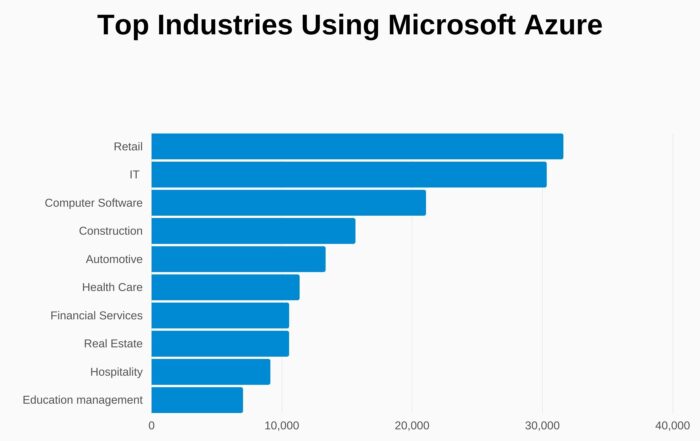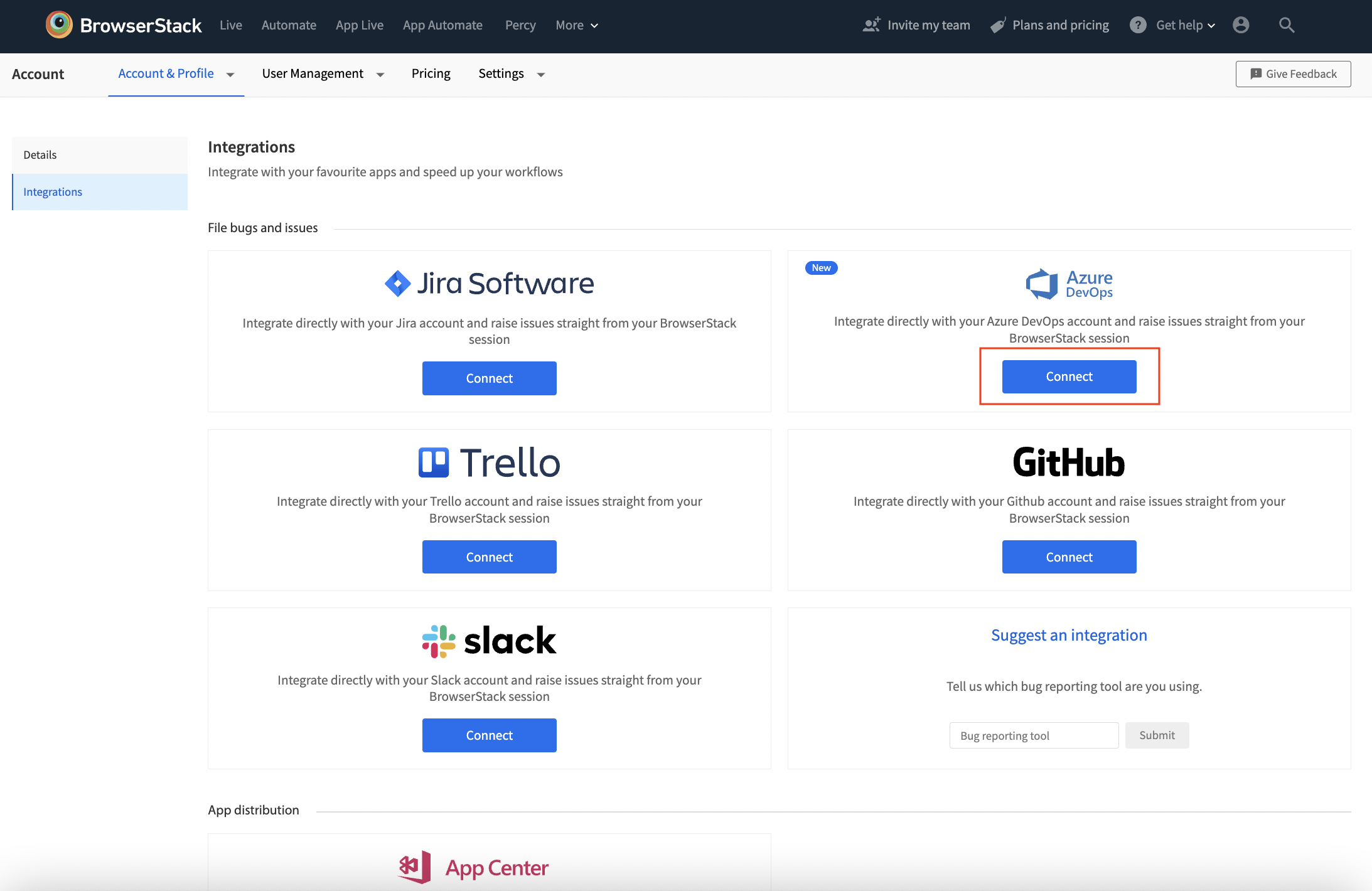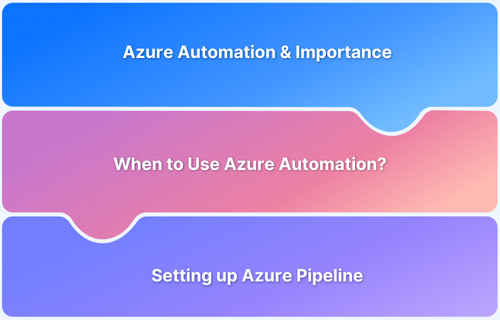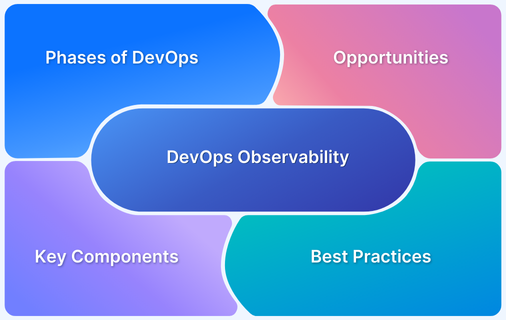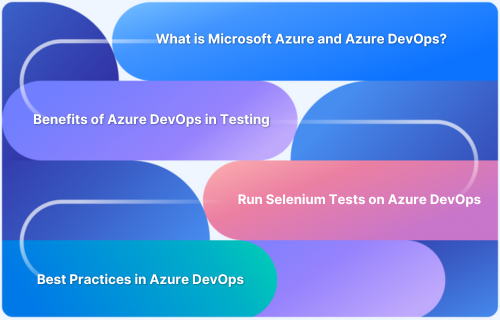DevOps is the approach to collaboration between development and operation teams. The collaboration includes building, validating, developing, testing, and deploying software. So, it set up a standard for the development environment that improves software efficiency, reliability, and security.
That being said using Azure DevOps make your team more productive and efficient. It creates a process for developers, managers, and testers to work together in the entire SDLC process.
As per Azure Revenue and Growth Stats:
- Azure users worldwide are approaching the 1 billion mark.
- 85% of Fortune 500 companies utilize it.
- 40% of its users are from the USA, and 7% are from the UK.
- Top industries preferring Azure include Retail, IT, Computer Software, Construction, and Automotives.
In the following sections, let’s understand the concept of DevOps in Azure with it’s importance, challenges, benefits, and best practices for implementing it.
What is Azure?
Azure or Microsoft Azure is the cloud computing platform created by Microsoft. ‘Project Red Dog’ was announced late in 2008, and released as ‘Windows Azure’ in early 2010.
- Azure Pipelines, a build-and-deploy software, was launched to give Microsoft Azure a stronghold in the software deployment market.
- It’s a huge collection of servers and networking hardware that eliminates physical space requirements, and they host a complex set of distributed apps.
- Azure provides computing, networking, storage, database, data analytics, and more services.
Importance of DevOps in Azure
- DevOps in Azure includes easily adapts any tool because it’s hosted on the cloud.
- Cloud technology offers a remote workspace for the team. So, it becomes easy to perform DevOps and collaboration as well.
- Automation test execution becomes easy with cloud computing.
- DevOps needs a different tools setup. When these tools are placed on the cloud, it will take a centralized architecture. Thus it will be easy to access those tools.
Overview of DevOps Principles
The DevOps principles are based upon Agile principles. That implies cooperation between individuals. But DevOps leverages the boundary from individual to the whole organization. Therefore, the DevOps principles maintain the culture within an organization that includes processes, people, and tools.
Must Read: How do Agile and DevOps interrelate?
Continuous Integration (CI)
For CI, the developers must submit their codes in a central repository, frequently in a day. The DevOps prefer a small piece of code to be integrated time by time. This process checks the compatibility between the new codes and the existing codes. Also, it reduces the risk of blockages or interruptions.
The recommended tools of CI are- Jenkins, CircleCI, etc.
Continuous Delivery (CD)
Continuous delivery in DevOps helps to release code updates as fast as possible. The CD makes the developers manually deploy code that ends in an automated code release. The codes should pass all the tests. If the QA team finds any code bugs, developers need to change it.
The version control system helps developers to ensure there is no problem with code integration.
Continuous Deployment (CDep)
A new version of software transfers to the production environment after being successfully tested and validated. Then it will be implemented on servers that end in final production or deployment. Now, the end users also get access to the new version.
Continuous Monitoring (CM)
This time, the new software goes live, and the operation team monitors it as part of Continous Monitoring in DevOps. They monitor the performance, usage, and if there is any bug in the software. Also, they collect data about the app that helps in future developments.
DevOps Practices in Azure
DevOps practices are important in Azure for five reasons:
1. Infrastructure as code (IaC)
DevOps with Azure simplifies infrastructure provisioning and resource configuration with infrastructure as a code (IAC). IAC provides the automation process for infrastructure deployment. It uses PowerShell, Terraform, Ansible, etc., for scripting.
Also Read: Configuration as Code: Everything to Know
2. Configuration Management
The configuration management tools and Azure cloud system build, test, validate, and create real-time reports for the infrastructure configuration of an app. The CM tools and Azure together create a common pipeline to complete the task.
Your team can manage hybrid and multi-cloud environments with the combined tools. Again, they can verify Azure services’ configuration according to your company security policies. DevOps Configuration Management automates mundane maintenance tasks, and frees up dev time for actual programming.
3. Release Management
DevOps handle release management easily like a pro. Regarding DevOps on Azure, you need to configure with Azure DevOps Pipeline. It accelerates your delivery and reduces risk factors. Then you need to create a release pipeline with artifacts for the ultimate release of your software.
An artifact is a deployable feature of the software. Azure pipeline build creates the artifact. The process starts with approval before deployment and ends with approval post-deployment.
NOTE: The BrowserStack Azure DevOps Extension eases the process of configuring Azure Pipelines to run tests on BrowserStack Automate.
Integrate Automate with Azure Pipelines
4. Test Automation
DevOps Automaton testing identifies problems like security and compliances at the testing phase. It helps to quickly authorize and configure the production environment. You can run Selenium and Appium tests for DevOps on Azure. It also helps in continuous build, testing, deployment, and finding bugs.
5. Application insights
You can manage the app’s performance and get instant analytics through Azure Application Insights. Additionally, you can monitor infrastructure health with Azure Log Analytics and Azure Monitor.
Benefits of DevOps in Azure
Azure DevOps offers products/services like- Azure Test Plans, Azure Boards, Azure Repos, Azure Pipeline, and Azure Artifacts.
Also, it provides a server for version control, building, testing, and different types of management. Azure DevOps offers a visual studio online to provide DevOps services for the stakeholders.
The top 5 Benefits of Azure includes:
1. Faster time to market
DevOps on Azure has become faster due to CI, CD, and CDep. Also, it relies on the IaaS model that automates configuration and provisioning development environments using JSON and YAML. Strong security and compliance protect the vulnerabilities and attacks in the infrastructure. These all things result in a faster time-to-market approach.
2. Improved collaboration
Azure DevOps has the Visual Studio Team System for collaborative culture. It creates a process that helps the developers, managers, and testers to work together in the entire SDLC process. Azure Boards provides a set of Agile tools to plan, track, and find code defects for this purpose. It includes a rich feature set for internal users in Microsoft also.
3. Increased efficiency and productivity
Adopting each Azure DevOps service independently and integrating them with third-party tools like Ansible is easy. Continuous deployment increases productivity by quickly determining defects, alerts about issues, and deploying solutions to changes.
Apart from these, Azure takes less time to repair any failed feature and CI/CD pipelines reduce the non-critical defects.
4. Improved quality of deliverables
It helps organizations improve the quality and deliverability of their products by using Agile methodologies like Kanban and Scrum. They have a small iteration period. So, they are faster than any traditional software development process.
5. Enhanced customer satisfaction
The Azure DevOps users get access to the new features every three weeks. Microsoft published the product roadmap and committed to rapid iteration of those features.
It supports different programming languages (C#, Java, Python, etc.), platforms (Windows, Linux, Mac), and clouds (Azure, AWS, GCP) also. Thus it can easily fulfill customer requirements.
Challenges of implementing DevOps in Azure
- Legacy systems: If you are still sticking to a legacy system, your DevOps team faces more challenges. Most of these systems have become outdated. So, they have performance issues- slow loading, security issues, and more. So, it’s necessary to replace legacy systems with IaaS or Microservices.
- Culture change: As development and operations work differently, combining two cultures might be challenging. So, your team needs more communication, better understanding, and sharing of ideas.
- Skill gap: The organization should provide correct employee training and skills. They need both the skills for DevOps and Microsoft Azure. Moreover, inter-organization communication, gathering feedback from stakeholders, and adaptation to DevOps culture will help to improve skill gaps.
- Security concerns: Security loopholes in the DevOps pipeline will be the cause of cyber-attacks and data breaches. So, you need to lock the pipeline parts that compromise irregularities, limit the amount of sensitive info, etc.
- Tooling: You face many difficulties when people from different technical backgrounds use different tools and technologies. So, the best practice is automating both the system- development and operation.
Best Practices for Implementing DevOps in Azure
Adopt a Continuous Improvement Mindset
Azure DevOps make your team more productive and efficient. Microsoft’s Power BI provides analytics and insights to the team that ensure continuous user improvement and deliverables.
Focus on Automation
Implementation of automation in testing, deployment, integration, and monitoring gives continuous delivery and consistency in results. Azure Pipelines helps to automate testing and continuous integration. GitHub Actions helps to automate workflows.
Encourage collaboration
GitHub enables a good platform for developers to keep their coding clean and share their codes and thoughts with other team members. In this way, they can work collaboratively.
Implement a DevOps culture
DevOps with Azure helps to build, deploy, and manage apps by providing multiple tools. They set DevOps culture with collaboration, teamwork, and responsibilities for your team. Azure DevOps offers a different culture for your organization that creates small changes. But it will leverage the organization toward success.
Measure and analyze metrics
There are 4 metrics in DevOps research and assessment (DORA)- deployment frequency, lead time for changes, mean time to recover, and change failure rate. Azure DevOps server can provide raw data to calculate and analyze these metrics.
You can configure some other analytics solutions on Azure DevOps. They are- Analytic Service, analytic Views, Power BI, etc.
Why Integrate BrowserStack with Azure?
- BrowserStack Automate offers you to run Selenium tests with Azure pipelines which ease the process of configuring Azure Pipelines to run tests.
- Teams can also integrate Appium tests with Azure Pipelines using an extension that connects the CI server to the BrowserStack Appium Grid.
- Report bugs using Microsoft Azure DevOps integration

